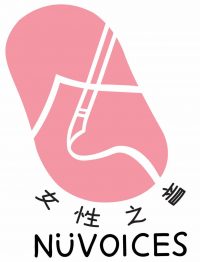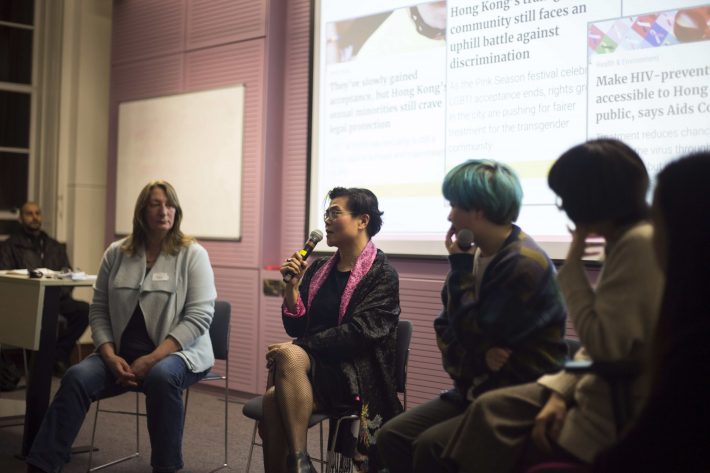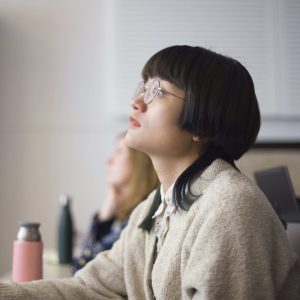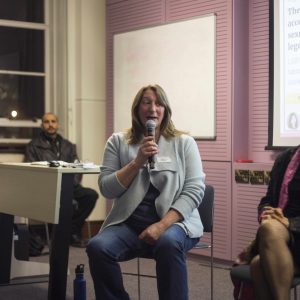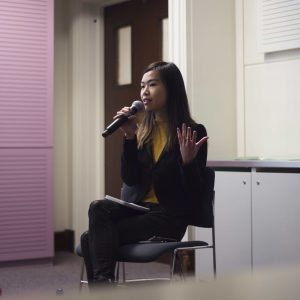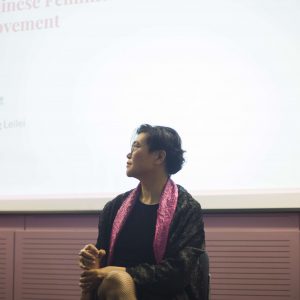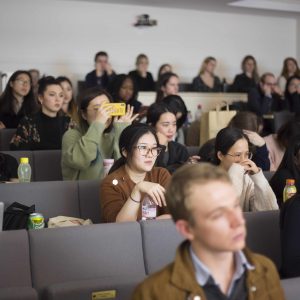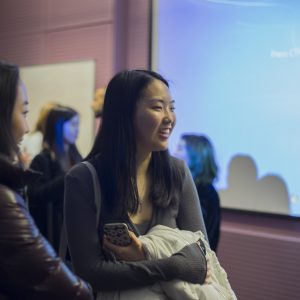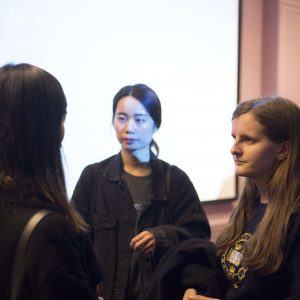BY ALYSSA OURSLER
It was a long-kept family secret that Lijia Zhang’s grandmother was sold to a brothel at the age of 14. Zhang—a factory-worker-turned-writer who has penned articles for The Guardian, the South China Morning Post, Newsweek and more, in addition to publishing two books—traced her family’s history as part of a wanel (women panel) hosted by NüVoices on March 22 in honor of the collective’s official London launch.
Moderated by former Newsweek Beijing Correspondent Mary Hennock (@MaryHennock), the wanel featured diverse feminist speakers including Zhang (@zhanglijia64), Asia-focused journalist Jessie Lau (@_laujessie) and leading Chinese activists Zhang Leilei and Xiao Meili. Organised by NüVoices board member Lau, the event was hosted by Aki Elborzi at SOAS, University of London. Volunteers included journalist Alyssa Oursler, LSE-PKU International Affairs Master’s student James Porter and photographer Antonio Wan.
WATCH: “Being feminist in China: Gender issues across generations”
“I was born at the right time,” Zhang, a NüVoices board member, told a sold-out audience of over 80 people. The shift to a market economy in China has lifted hundreds of millions out of poverty. But, she added, it has also expanded inequality—and women have largely shouldered that burden. Lau, also NüVoices London Chair, and Leilei agreed: the role of women has changed in mainland China and Hong Kong, but challenges around around inequality and other issues, from sexual harassment to discrimination, remain.

Leilei, a leading figure in China’s growing #MeToo movement, highlighted the performance art and national billboard campaigns she has helped organize in an attempt to drive awareness and radical change with regard to sexual harassment. “We don’t have anything. We don’t have money, resources,” she said. “We use our creativity.” That continues to be the case, even as the government has tightened its censorship in recent years, Meili added. In 2014, Meili walked from Guangzhou to Beijing, a distance of 2,000km, to raise awareness about sexual abuse in China.

Lau, a freelance journalist from Hong Kong who has written for Quartz and The Economist, among others, spoke about her work covering gender issues in the city as a reporter for the South China Morning Post. “There is this idea that Hong Kong is in a post-feminist era which, growing up in Hong Kong, I really rejected,” she said. The gender pay gap has widened, sexual harassment has proliferated, and domestic violence is barely discussed, she added.

After discussing their work and perspectives on feminism in China and Hong Kong, the panelists took questions from moderator Hennock—a journalist who has also reported from China for The Guardian and the BBC—and attendees. The first question built on Zhang’s opening point. Have women been pushed back by the opening of the market, Hennock asked. The picture, panelists said, is complex.
The market economy expanded gender inequality because the government retreated a lot of its responsibility, Zhang said. As she wrote in a piece for the New York Times, many companies post job ads that discourage women to apply or demand they have certain physical characteristics. And while women shoulder the cooking responsibility in the household, they are ignored in the public sector where they could actually make money for doing it.
Similarly, when one attendee suggested that Chinese women are better off than in a lot of places in world, Lau responded that it’s not just about economic output. Many women are doing well economically, but there remains a significant lack of mechanisms for protecting them from domestic violence and sexual harassment and severe limitations around sexual liberation and choice. “Those are two very separate but important discussions.” she said.
About the author
Alyssa Oursler is a journalist who has written for USA Today, Popular Science, SF Weekly, the Los Angeles Review of Books, and more. She is currently pursuing a Master’s in Criminal Justice Policy at the London School of Economics. Find her at alyssaoursler.com and on Twitter: @alyssaoursler.
About the photographer
Antonio Wan is a photographer and designer based in London. Instagram: @antoniogarnetwan
